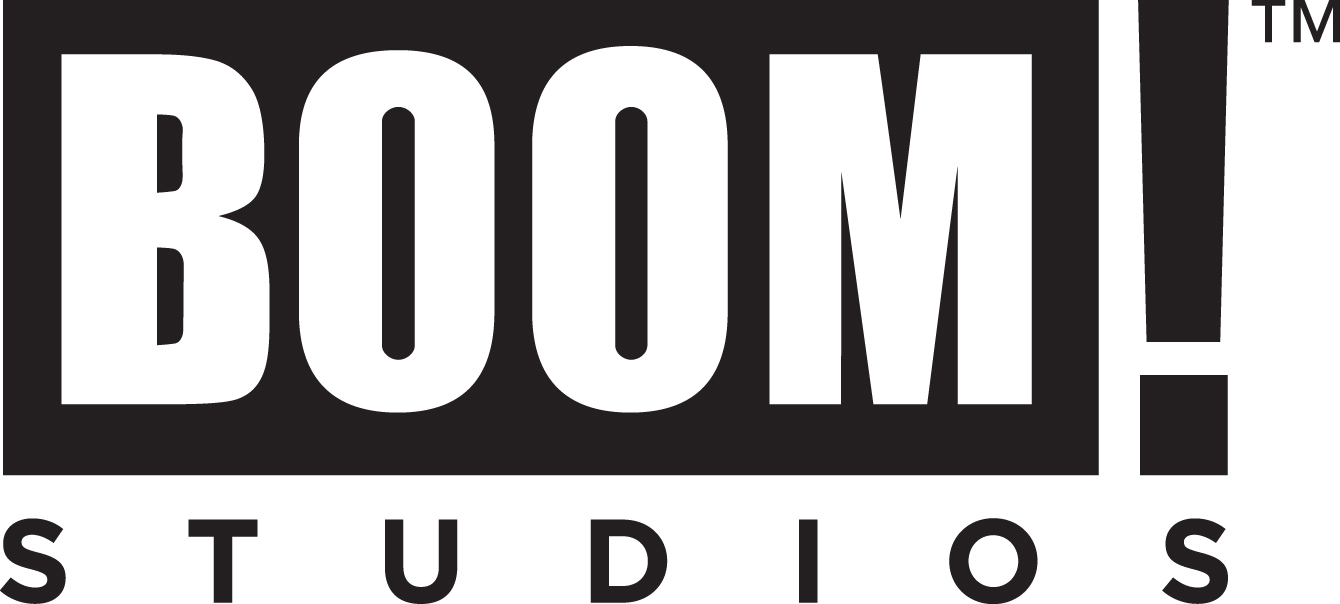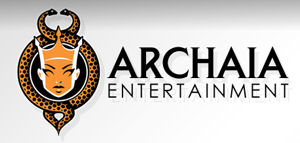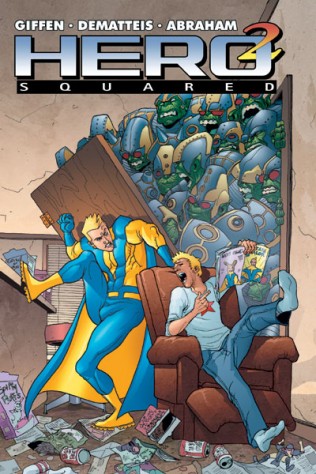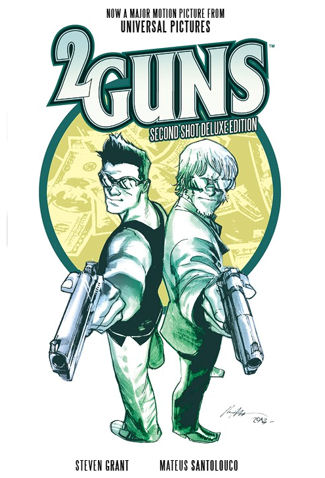
Years ago, Ross Richie started a little company out of his apartment — for the sake of the myth, let’s make it a little apartment — and boldly named it Boom! Studios.
They had one book — and it was a good one. J.M. DeMatteis and Keith Giffen took their “bwaa ha ha” brand of comedy adventure writing which had made Justice League International one of the best books of the eighties, and applied it to Hero Squared. They told the tale of a young slacker and film-school dropout who comes face to face with an alternate universe version of himself — one who had gained superpowers and become the Earth’s greatest superhero, though still hiding tragic personality flaws. It was funny. It was moving. It was great.
And thus Boom! was born, expanding and attracting the attention of many with original books, licensed books (including the best Muppet titles you’ll ever read, if you can now find them). Today, they’re a varied line that features horror, superheroes, thrillers and a great kids line, Kaboom! that publishes my son’s favorite book, Bravest Warriors, though everybody at Illusive Comics and Games has to argue that Adventure Time is as good. Hey, they’re both Boom!
This year, Boom! turns the tables, not licensing from Hollywood, but instead launching into Hollywood with Universal Studios’ adaptation of their graphic novel Two Guns. On the heels of that, just a couple of weeks before Comic-Con, Boom! Studios made public their purchase of Archaia Comics, themselves pretty well known for a quirky book called Mouse Guard.
And so on a Friday afternoon at Comic-Con, Boom! founder Ross Richie sat down with me to talk about the company past, the present and that ever brightening future…
Derek McCaw: I’m here with Ross Richie, Chief Executive Officer and… what DO you call yourself?
Ross Richie: Chief Executive Officer and Founder. Or as I like to say, it’s my fault. (laughs)
Derek McCaw: That’s good that you get to say that, and that you’re willing to say that.
Ross Richie: Of course.
Derek McCaw: When we were first trying to nail down this interview time, it was just about your big movie, Two Guns, coming out.
But since then you’ve made another big move, so we’ve got a couple of things to talk about. Let’s start with the big news of the last couple of weeks, which is the purchase of Archaia. What led to that move?
Ross Richie: I think Archaia was in a place where it had excellent content. They had had a really bad year — these are all things we’ve talked about publicly — and they were working really hard to right the ship. Put it back on track. When we looked at the company, we thought, “this is a great way for us to grow.” Because they don’t do what we do.
What I like to talk about is, eight years ago, in my own spare bedroom of my apartment, I started this company with a computer and a phone. And what I figured out was that I had never published a comic book, I’d never edited a comic book. Now I’d worked for Malibu Comics and I was a marketing guy at Malibu.
Derek McCaw: I didn’t realize you worked for Malibu!
Ross Richie: Absolutely!
Derek McCaw: That was my favorite imprint.
Ross Richie: Thank you! I wish I could claim anything, but I just sold it.
Derek McCaw: Those were great books.
Ross Richie: Thank you very much. I’d never edited, I’d never published, and so I focused on doing one comic book a month, which was Hero Squared, that I could be proud of and really really worked. And once I figured that out, how do I do two a month? And then how do I do three a month?
And now we’re here, where we’re doing over 25 books a month, and how do we continue this growth? One of the ways to continue, besides doing one more book a month, is to add another company. And with that other company, their material complements ours.
We’re sort of a very mainstream positioned company. You look at Six Gun Gorilla, you look at Polarity, you look at Mike Carey’s Suicide Risk or Clive Barker’s Next Testament, none of those are Archaia books. And then you look at Archaia with A Tale of Sand, The Reason for Dragons, then there’s Spera and Mouse Guard, of course…all this great artistic material, and it’s a very different flavor. It doesn’t cannibalize what we already have, but instead extends it to people that we haven’t reached yet.

That’s a part of it, to build out and grow. And my joke is, the name of the company isn’t whimper. So we’re not going to go be a boutique, that’s focused on three or four comics a month. We’re going to see how we can take over the world, because we’re Boom! It’s what we do.
Derek McCaw: And it is. That makes sense. Yet we do hear rumors of companies circling each other. Disney owns Marvel, Warner owns DC, do publishers have to swallow each other up to survive?
Ross Richie: Oh, no. The market’s up. Market’s up great. The number I heard is twenty (percent in sales). I haven’t looked at the web today. Everyone’s doing fantastic. Everybody’s having a great year, it’s not just Boom! I mean, Boom’s having a killer year, which is awesome.
Image is having a great year, Dark Horse is having a great year, IDW is just crushing it. All those guys are my buddies. Every time I see Eric Stephenson at a convention, I give him a fist bump and say you’re just crushing it, because he is! He’s doing an excellent job. Mike Richardson is a friend of mine, he’s done a phenomenal job.
And that’s what we need. In this space, we need talented people to do amazing things. I think in particular, when you’re in independent comic book publishing, the moment a fan realizes that there’s exciting stuff outside of Marvel and DC, and they open up to some stuff that isn’t superheroes — and I am a HUGE fan of superheroes, I have ninety long-boxes in my garage, just ask my wife —

Derek McCaw: And you started with Hero Squared…
Ross Richie: Yeah! So at the core of it, I’m not bagging on superheroes, and I’m not on bagging on Marvel and DC. They’re phenomenal places. I’m friends with Dan DiDio and I’m friends with Dan Buckley. They’re great and they’re awesome and they’ve always been kind to me. But at the core of it, if Dark Horse is doing well and Image is doing well, and IDW and Dynamite, what it’s doing is it’s saying to the marketplace that there’s other exciting places.
Derek McCaw: And I know you’re old school, because the last time we met was when I handed you a book with a story I’d written from Monsterverse, and you knew Kerry Gammill…
Ross Richie: That’s right!
Derek McCaw: You were the kid back in Texas running around at conventions… I feel like there’s a whole bunch of people that came out of Texas and became comics guys, most of them West Coast, which is odd…
Ross Richie: Hey, Texas is the West, right? We’re West at heart. We’re not going to go back East. I love New York, it’s cool, but we’re Westerners. The thing everybody forgets is that three of the biggest cities in the United States — three of the top ten biggest cities — are in Texas. There’s Dallas, there’s Houston, and there’s San Antonio. According to the last census, San Antonio is bigger than Dallas. Everybody forgets. That’s where I’m from; it’s a really big city.
At the core of that, just on a population basis, you’re going to generate a certain amount of people who are… I mean, it’s just numbers! I mean it’s our intense creativity that makes us awesome. I mean it’s the water we drink in Texas. (laughs)
Derek McCaw: …and some people say Texans are crazy…
Ross Richie: Oh, we ARE crazy. Is being crazy bad? Because that might not work out for me. I am really crazy.
Derek McCaw: Crazy isn’t bad. Crazy is creative. And in my day job in education, we’re starting to rightly push creativity. I think that might be one reason comics are doing so well. People are looking around and looking for founts of creativity. I have more and more people coming to me, who aren’t readers, asking “what should I read? Because I heard these are cool…”
Ross Richie: Thank you.

Derek McCaw: So let’s talk 2 Guns. Just before the Con, I could NOT find a copy of this book, because I think what it is is that suddenly people realized hey, this movie is coming out and it’s a graphic novel, and they bought it up. But I did get it here and signed by Steven Grant. I remember Steven talking about this book years ago, in Comic Book Resources, about how he had this great idea but nobody seemed to want to bite… why did you bite?
Ross Richie: Where’s the downside? What’s funny is, I was here at the show, I think it was 2007, might have been 2006, and we go over to the Hyatt and we sit down. And I’ve known Steven since he did Edge for Malibu; the great Gil Kane drew that.
Steven and I would keep up through the years, maybe at Wondercon or San Diego, whatever. I’d been publishing a little bit, so he saw that I’d kind of gotten my sea legs at what we were doing. So he was like, hey, let’s figure something out.
We sat down, and he went over about twelve ideas, but we couldn’t really find anything on the list that we felt like really clicked. Back in 1998, he and I had talked about 2 Guns, and I was like (snaps his fingers) “what was that thing? You know, the thing with the guy and he’s undercover DEA and the other guy is undercover…” and he asked “2 Guns?” “Yeah! What are you doing with that?”
He was like “you want that?” And I said, “it’s brilliant, it’s amazing.” And I remember as we stood up from the meeting just saying, “we are doing that.” We had to get back to L.A. and figure it out. You know, he’s in Vegas, so we had to work it out fast. But I knew on my agenda items that THAT was the book.
Derek McCaw: BOOM! has adapted film properties like Die Hard and Hellraiser, but this would be the first time it’s gone the other way — a graphic novel to a movie. Does a publisher need to have that kind of Hollywood cred? Does this suddenly give Boom a little cache to the outside world that it didn’t have before?
Ross Richie: Sure.
Derek McCaw: What was the road to getting it there?
Ross Richie: Filip Sablik has a joke. When you publish comic books and you say that you don’t have a Hollywood strategy, you’re one of two things. You’re lying or you’re stupid.
The way I look at my relationship with Hollywood is that it’s not core to my business. Our business is publishing comic books. And we can make a great 2 Guns story. And if it ever turns into a good movie, or it happens to turn into a bad movie, who cares? It doesn’t matter, because we have at our core a great graphic novel that sits on the shelf, something that we’re proud of.

I sort of approach the Hollywood interest in graphic novels — I think it’s fantastic, I think it’s driving a lot of business into comic book stores. The Walking Dead is huuuuuge for our business. Robert Kirkman — we all owe him, what he’s done for the space and made people interested in comic books.
But my relationship with Hollywood goes like this: it’s Rorshach from Watchmen. You remember when Rorshach got captured, he turned around and said “you think that I’m stuck in here with you; what you don’t know is that you’re stuck in here with ME.” So at the core of this is, if you want 2 Guns, you’ve got to deal with me.
And it was a fantastic experience. It really was one of those Cinderella amazing things. I think at the core, if we go back and look at anything we did well, it’s that we picked the right partners. I think that’s critical. It’s like when you’re a writer, having the right artist, the right inker, the right colorist, letterer, person doing the cover. It’s about the team. All this is team sports.
So at a certain point, if you’re going to have one of your comic books getting made into a movie, you’re going to lose control. Because you can’t write a hundred and twenty million dollar check and get it made. Right? The guy that writes the check is the one that calls the shots.
What I did is that I chose Universal as my partner, and it turned out to be the right choice, because they really understood it. There were other people that wanted it, but I specifically chose Universal because I believed in them. Moving past that, I picked Marc Platt and his partner Adam Siegel because Adam made Drive and Adam made Wanted, and he does guys with guns, and he does it very well. And I looove guys with guns. It’s one of my favorite things to publish.

I thought we had this team, and it proved out. We interviewed Blake Masters, to talk to him about doing the adaptation, and he crushed it. He always understood it. During the phone call, Adam said, “if you take this graphic novel, what would you do with it?”
And Blake said, “I really think it’s all here, guys.” And Adam said, “yeah, but what would you change up, what would you do different?” And Blake said “ehhhh, I don’t really think I would do anything different. I’m gonna take this and I’m going to put it into a screenplay and then we’ll look at it and see if we need any more action sequences or where the act break is going to go, but we’ll have that discussion after I finish the script.” Blake was the right guy and he just killed it.
Derek McCaw: I have the book, and finding time to read at Comic-Con is ironically pretty hard to do, so I’m only a few pages in. But I talked to Steven Grant, and he seems so happy with this movie. And I’ve never really talked to him before, but from reading his column from years back, he’s always seemed like the kind of guy that if he wasn’t happy, he would have said it. He’d be honest about it.
Ross Richie: I think you’re exactly right.
Derek McCaw: I’m so excited to see a guy who has been kicking around the industry for so long finally achieve this level of success at this point.
Ross Richie: He’s such a talent. Such a solid writer, and his ability to deliver on this kind of material, guys with guns, done with such a sardonic, witty, dark complex way — you know, he has tools in his toolkit that he doesn’t get to use in conventional superhero writing. It’s so much fun to give him a stage and to showcase him. When you dig in, you’ll see. Great switchbacks, excellent reveals… he’s brilliant!
Derek McCaw: One of the things I really love about this is that when people see the movie, it’s not obviously a graphic novel. I mean, it’s not a genre that in this country people will realize oh — and then we get to say “see?”
Ross Richie: When is a comic book movie not a comic book movie? What is the sound of one hand clapping?
(both laugh)
Derek McCaw: You’ve got so much going on THIS summer, what’s the NEXT thing for you?
Ross Richie: We signed up George Perez to an exclusive. We’re going to be up to some hijinks with George, so that should be fun. We landed a really big license, and we got the guy who originated it to come back to it. And it’ll be pretty mind-blowing. When we announce it, you’re going to hit me up on Facebook and be like “no waaaay!” I promise. I’m not that guy. I’m not the hype guy. People are going to be really happy.
It’s a lot of fun. I mean, you’ve got to do licenses that are awesome. I mean, you look at Robocop, and there’s Frank Miller’s lost screenplay for Robocop 3, let’s turn that into a comic book.
Derek McCaw: Another thing I have to give you guys credit for, that impresses me, is that you’re able to do such a great kids’ line. My son has gotten into Bravest Warriors, and he tells me “Dad, this is the funniest thing I’ve ever read…”
Ross Richie: It’s one of my favorites.

Derek McCaw: You’ve got a fantastic kids’ line, a great regular line, and I think I want to end on that note. BOOM! is going forward…
Ross Richie: Thank you. I appreciate it. The name of the company ain’t whimper!




